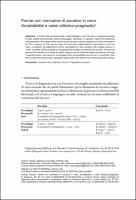Chapter Forme non normative di vocativo in ceco. Accettabilità e valori stilistico-pragmatici
| dc.contributor.author | Trovesi, Andrea | |
| dc.date.accessioned | 2024-04-02T15:51:05Z | |
| dc.date.available | 2024-04-02T15:51:05Z | |
| dc.date.issued | 2023 | |
| dc.identifier | ONIX_20240402_9791221502169_226 | |
| dc.identifier.issn | 2612-7679 | |
| dc.identifier.uri | https://library.oapen.org/handle/20.500.12657/89257 | |
| dc.language | Italian | |
| dc.relation.ispartofseries | Biblioteca di Studi Slavistici | |
| dc.subject.classification | thema EDItEUR::C Language and Linguistics::CF Linguistics | |
| dc.subject.classification | thema EDItEUR::D Biography, Literature and Literary studies::DS Literature: history and criticism | |
| dc.subject.other | Vocative case | |
| dc.subject.other | Spoken Czech | |
| dc.subject.other | Pragmatics choices | |
| dc.title | Chapter Forme non normative di vocativo in ceco. Accettabilità e valori stilistico-pragmatici | |
| dc.type | chapter | |
| oapen.abstract.otherlanguage | In Czech the vocative case is still obligatory and the set of vocative endings is best preserved amongst Slavic languages. However, in spoken Czech the following irregularities in the usage of the vocative can be observed: a) substitution of the nominative for the vocative on the second part of masculine addressative expressions such as ‘pan + surname’; b) substitution of the nominative for the vocative with single names; c) “new” vocative forms created by dropping final vowels on female first names. The article reports the results of a study on such irregular forms that has been carried out through a questionnaire, and aims to investigate their acceptability as well as to ascertain how they are perceived by native speakers especially with reference to their pragmatic values. | |
| oapen.identifier.doi | 10.36253/979-12-215-0216-9.09 | |
| oapen.relation.isPublishedBy | bf65d21a-78e5-4ba2-983a-dbfa90962870 | |
| oapen.relation.isbn | 9791221502169 | |
| oapen.series.number | 54 | |
| oapen.pages | 21 | |
| oapen.place.publication | Florence |

